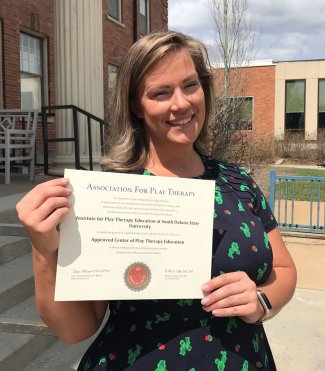The play therapy program in South Dakota State University’s Department of Counseling and Human Development has reached another milestone.
It is the state’s first program to gain approval as a center for play therapy education from the Association for Play Therapy. The national professional society, established in 1982, offers training and continuing education as well as credentialing for registered play therapists.
Play therapy helps children with social/emotional, behavioral and developmental disorders, including autism spectrum disorder and attention deficit/hyperactivity disorders, learn to communicate and interact with others as well as develop problem-solving skills.
The Institute for Play Therapy Education at SDSU is one of only two APT-approved centers in the Upper Midwest and 30 in the nation.

Becoming an approved center recognizes that “we have a history of providing quality play therapy instruction,” explained assistant professor Staci Born, who leads SDSU’s graduate coursework in play therapy. Born, who is a registered play therapy-supervisor, began offering play therapy coursework at SDSU in 2017.
“This gives our department strength to continue to provide education and clinical experiences for our graduate students,” Born said. In addition to 150 educational hours, play therapy graduate students must have 350 hours of supervised clinical experience. Recently, the South Dakota Board of Regents approved two new courses related to the clinical requirements.
Professor Jay Trenhaile, head of the Department of Counseling and Human Development, commended Born for her commitment to expanding the mental health counseling program by adding a play therapy curriculum. “The mental health professionals Staci is training will have a huge impact on children and their caregivers forever,” Trenhaile said.
Jill Thorngren, dean of the College of Education and Human Sciences, said, “Becoming an approved center officially brings the training our graduates receive to a new level. It acknowledges the impact the students’ expertise in play therapy can have on the mental/emotional health of children in the state and the region.”
Currently, 32 individuals have completed coursework at SDSU to become registered play therapists—that includes traditional graduate students as well as practicing professionals. This fall, 17 mental health clinicians across the state of South Dakota will begin a specialized play therapy training experience. These clinicians were chosen through an application process to ensure that rural communities can also gain professionals trained in the therapeutic powers of play. This training opportunity is enhanced by grant funding through the South Dakota Early Childhood Mental Health Collaborative, to supplement tuition costs, thus reducing tuition by 90%.
The South Dakota Early Childhood Mental Health Collaborative, funded by the Substance Abuse and Mental Health Service Administration, is helping mental health care professionals in eastern South Dakota identify and work with children from birth through age five who are experiencing mental health/emotional difficulties. Born leads early childhood mental health workforce training across South Dakota and assistant professor Christin Carotta works on prevention Inter-Lakes Community Action Partnership Head Start, which serves children in 14 eastern South Dakota counties.
In terms of research, Born said, “becoming an approved center not only pushes us to continue to produce, but also highlights what we’ve already done.”
Republishing
You may republish SDSU News Center articles for free, online or in print. Questions? Contact us at sdsu.news@sdstate.edu or 605-688-6161.

